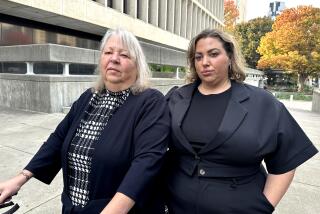Bouvia’s Lawyers Petition Court for $115,000 in Fees
- Share via
Attorneys for Elizabeth Bouvia went to court Thursday seeking more than $115,000 in legal fees, claiming that a court order that prevented doctors from force-feeding the 29-year-old quadriplegic established an important precedent for the right of patients to refuse medical treatment.
The petition, submitted to Superior Court Judge Warren Deering, asserts that Bouvia’s attorneys are entitled to reimbursement because the state appellate court ruling in April established for the first time that all adults--not just the elderly or terminally ill--have the right to refuse life-sustaining medical care.
The right to refuse treatment, Bouvia attorney Richard P. Scott said, “isn’t just for somebody with one foot in the grave and one foot on a banana peel.”
Attorneys for Los Angeles County contend that the case of the articulate, young cerebral palsy victim who had already lost an earlier court fight over her wish to deliberately starve herself to death is a unique one that is not likely to have widespread effects.
The distinction is important because, under California law, successful plaintiffs are entitled to attorney fees if they have obtained the enforcement of “an important right affecting the public interest.”
A Superior Court judge in Riverside had denied Bouvia’s request in 1983 to deliberately starve herself to death to put an end to a lifetime of suffering. But in a new case brought after she transferred to Los Angeles County/USC Medical Center, and later High Desert Hospital in Lancaster, Bouvia said she no longer had any plans to end her life. She agreed to eat as much as she could keep down if doctors would remove the nasal feeding tube that she found so distasteful.
The 2nd District Court of Appeal ruled that whether or not Bouvia had an intent to die was “immaterial. . . . If a right exists, it matters not what ‘motivates’ its exercise.” The right to refuse treatment, the court ruled, “is a moral and philosophical decision that, being a competent adult, is hers alone.”
Deputy County Counsel Steven Carnivale argued Thursday that at least two other previous appellate court decisions in California had clearly established patients’ rights to refuse treatment in most cases. But a file of declarations submitted by Bouvia’s attorneys from health law experts throughout the nation suggests otherwise.
More to Read
Sign up for Essential California
The most important California stories and recommendations in your inbox every morning.
You may occasionally receive promotional content from the Los Angeles Times.













